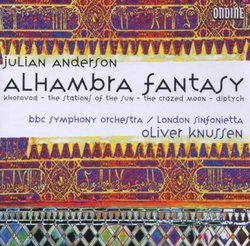| All Artists: Julian Anderson, Oliver Knussen, BBC Symphony Orchestra, London Sinfonietta Title: Anderson: Alhambra Fantasy; Khorovod; The Stations of the Sun Members Wishing: 0 Total Copies: 0 Label: Ondine Original Release Date: 1/1/2006 Re-Release Date: 8/22/2006 Genre: Classical Styles: Historical Periods, Modern, 20th, & 21st Century, Symphonies Number of Discs: 1 SwapaCD Credits: 1 UPC: 761195101223 |
Search - Julian Anderson, Oliver Knussen, BBC Symphony Orchestra :: Anderson: Alhambra Fantasy; Khorovod; The Stations of the Sun
 | Julian Anderson, Oliver Knussen, BBC Symphony Orchestra Anderson: Alhambra Fantasy; Khorovod; The Stations of the Sun Genre: Classical |
Larger Image |
CD DetailsSimilar CDs
|
CD ReviewsA major talent in modern music SONNET CLV | Paradise, Montana | 02/26/2007 (5 out of 5 stars) "Julian Anderson, still a young man by composer standards, is splendidly represented in this disc conducted by the inimitable Oliver Knussen, who, along with elder statesman Pierre Boulez remains the leading champion of contemporary music. I have been following Knussen's career since I first became aware of him -- upon hearing him conduct, at the tender age of 15, his precociously splashy First Symphony with the London Symphony Orchestra. That was just about the time Julian Anderson was born, and Anderson's equally precocious first major work, Diptych, is represented on this disc along with a handful of later pieces. Yet the album is worth its price for Diptych alone, a sprawling, noisy, melodic, reaching, searching, fantastical, colorful, lyrical, bombastic, tender, and all-round just wonderful piece of contemporary music. It is no wonder conductor Knussen can so identify with the piece. One must imagine that Knussen is remembering back to that LSO concert of 1967 and his conducting debut of his own early symphony as he weaves his way through the pages of Anderson's piece. There is love and respect in every note -- from all parties involved: composer, conductor, performers. And Diptych is only the beginning -- the earliest work on this sampler disc of Anderson's compositions that range over a period of ten years, through the 90's. The album is simply well-worth hearing. If you love contemporary music, it's a must have. If you want to find out what all the fuss of contemporary music is about, there is no better place to start than here. The range of expression is astounding. Each piece is a gem. Get this disc. Your modern music collection is conspicuously naked without it. --SONNET CLV--" Per Norgard meets Bela Bartok in contemporary England Christopher Culver | 07/20/2008 (4 out of 5 stars) "I was really excited when I came across this CD. I have long known the young English composer Julian Anderson as an insightful commentator on contemporary composers and a vocal supporter of Per Norgard, my favourite. I was also aware that he has a keen interest in the folk music of certain Eastern European countries where I spend a lot of time. Ondine has issued the first recording completely dedicated to Anderson's music, and Oliver Knussen leads the BBC Symphony Orchestra and the London Sinfonietta.
"Khorovod" (1996) is Anderson's most popular work, and it's easy to see why. An exhuberant bundle of Balkan dance rhythms, it holds the listener's attention throughout and offers a festiveness rarely heard in contemporary music. One notes with pleasure that Anderson's soundworld is diatonic and informed by the music of the spectralists, but without the shackles of traditional Western tonality. "Alhambra Fantasy" (2000) begins with a similar folk dance sound--though one can immediately hear that Anderson's skills as an orchestrator have matured--before going into more gentle lines evocative of the Arab world, and seems all very confident and elegantly crafted "The Crazed Moon" (1997) opens with an exotic fanfare by offstage trumpets, moves into percussion still low in dynamic, and then widens into slowly developing orchestral polyphony. When so much of Anderson's music is joyful and exhuberant, this piece is remarkable for its apocalyptic soundworld, inspired by a terrifying Yeats poem. The amount of strands going on at the same time here offer excellent relistening value. The two-movement "Diptych" (1989-90) was Anderson's first orchestral work. The composer wanted to write two very different scenes, but with similar music material. The first movement, "Parades", is discontinuous with a wide array of percussion sounds, and I sense a clear inspiration for Per Norgard's Symphony No. 4. The second, "Pavillons en l'Air", is more coherent and brass-heavy. It states more overtly the melodic ideas of the work, and develops a lovely passacaglia. This is a very mature piece, and one can hardly believe that it's a student work. I give this CD only four stars because at a few moments Anderson's music slips into that same sort of generic British orchestral modernism one finds in the lesser work of Birtwistle, Benjamin or Ades, and I don't care too much for the work "Stations of the Sun". Nonetheless, I'm pleased to have discovered a character that synthesizes contemporary visions of tonality versus atonality with rich rhythms from exotic parts of the world." |


